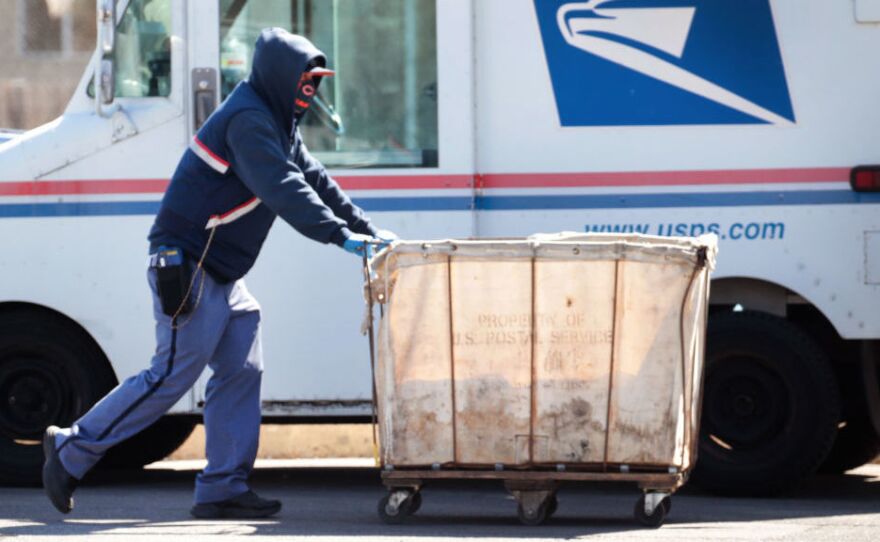On Aug. 3, a prescription for Zach Matheny's blood thinning medication was filled at his pharmacy and sent out for delivery via the U.S. Postal Service. It never arrived at his home in Columbus, Ohio.
"After a week I started to get worried, so I went ahead and called the pharmacy," Matheny says. "And after some back-and-forth, they essentially gave me the answer along the lines of, 'Well, it might be lost because of everything going on.'"
Recent delivery delays have raised concerns about the U.S. Postal Service handling ballots for November's election. They've also created immediate worries for those who rely heavily on the service to obtain lifesaving medications.
There have always been minor issues with medication delivery by mail, but that problem has been exacerbated by recent changes imposed by the Trump administration, such as limits on overtime and a requirement that trucks leave on schedule even if mail isn't loaded yet.
"We have heard some extreme anecdotes over the last couple weeks where patients are waiting one, two, three weeks for their medications," says Antonio Ciaccia, director of government and public affairs at the Ohio Pharmacists Association, adding that he has never heard so many complaints about delivery delays.
Matheny called the Postal Service about his prescription and was told that employees couldn't locate his medication. He called his insurer, but it wouldn't approve another refill because the medication is too expensive.
So Matheny has been buying a single blood thinner pill from a community pharmacy every few days, when he can afford it. He has spent more than $400 so far.
He's hoping that will tide him over until next month, but he's still worried about the consequences of skipping days of his medication.
"I could die," Matheny says. "The issue with blood clots is, if you do not catch it in time, they will move up through your body, get up to your brain and explode. ... I'm really worried."
Matheny is not alone. According to data from before the COVID-19 pandemic, collected by the Kaiser Family Foundation, Ohio residents rely on mail-order prescriptions more per capita than any other state in the country.
Nationally, an Ipsos poll found that 1 in 5 Americans got medication through the mail in the past week, and 1 in 4 of them experienced a delay or nondelivery. The USPS handles approximately 1.2 billion prescription shipments every year. That's nearly 4 million a day, six days a week, according to the National Association of Letter Carriers.
Among those who depend on the service are vulnerable residents: patients with chronic health issues, rural residents, veterans and the elderly.
"People who depend on this vital service to get their medications have a very significant potential for having negative health outcomes," says Dr. Rob Davidson, an emergency physician in Michigan and the executive director of the Committee To Protect Medicare, a nationwide group of physicians advocating for health care affordability.
Since the pandemic, even more people have opted to receive their medications by mail to avoid possible exposure in stores or to save money.
"People are being told to stay home, particularly elderly folks; people with preexisting conditions who are more likely to have prescription medications are being told to limit their contact in public," says Davidson. "All indications are that the utilization of mail-order pharmacies and mail-order prescriptions has gone up."
And the Postal Service's recent decision to decommission some mail-sorting machines could make delays even worse.
Though delays may be short — as in Columbus, where the delays are one to two days, according to Mark Camilli, Ohio's representative in the National Association of Letter Carriers — even a few days' delay can harm a person's health.
And Ciaccia, of the Ohio Pharmacist Association, says many Ohioans have no choice but to get their medications through the mail.
"A lot of mail-order uptake can be attributed back to requirements by pharmacy benefits managers or insurers," he says.
If medications arrive late, Ciaccia says, they may have been improperly stored and no longer effective. If the medications never arrive, as with Matheny's, the patient either goes without or pays out of pocket.
"This is not going to be life or death for everybody," Ciaccia says. "But for a significant amount of patients that rely on these medications to stay well and stay alive, any type of delay in drug therapy could mean the difference between a patient being in the hospital and a patient being in the ground."
Postmaster General Louis DeJoy told a U.S. Senate committee on Friday that his agency won't make any more changes in service until after the election, and the House passed legislation to block operational changes and add $25 billion to the Postal Service budget. But some lawmakers fear damage already has been done.
This story was produced by Side Effects Public Media, a news collaborative covering public health.
Copyright 2020 Side Effects Public Media. To see more, visit Side Effects Public Media.






